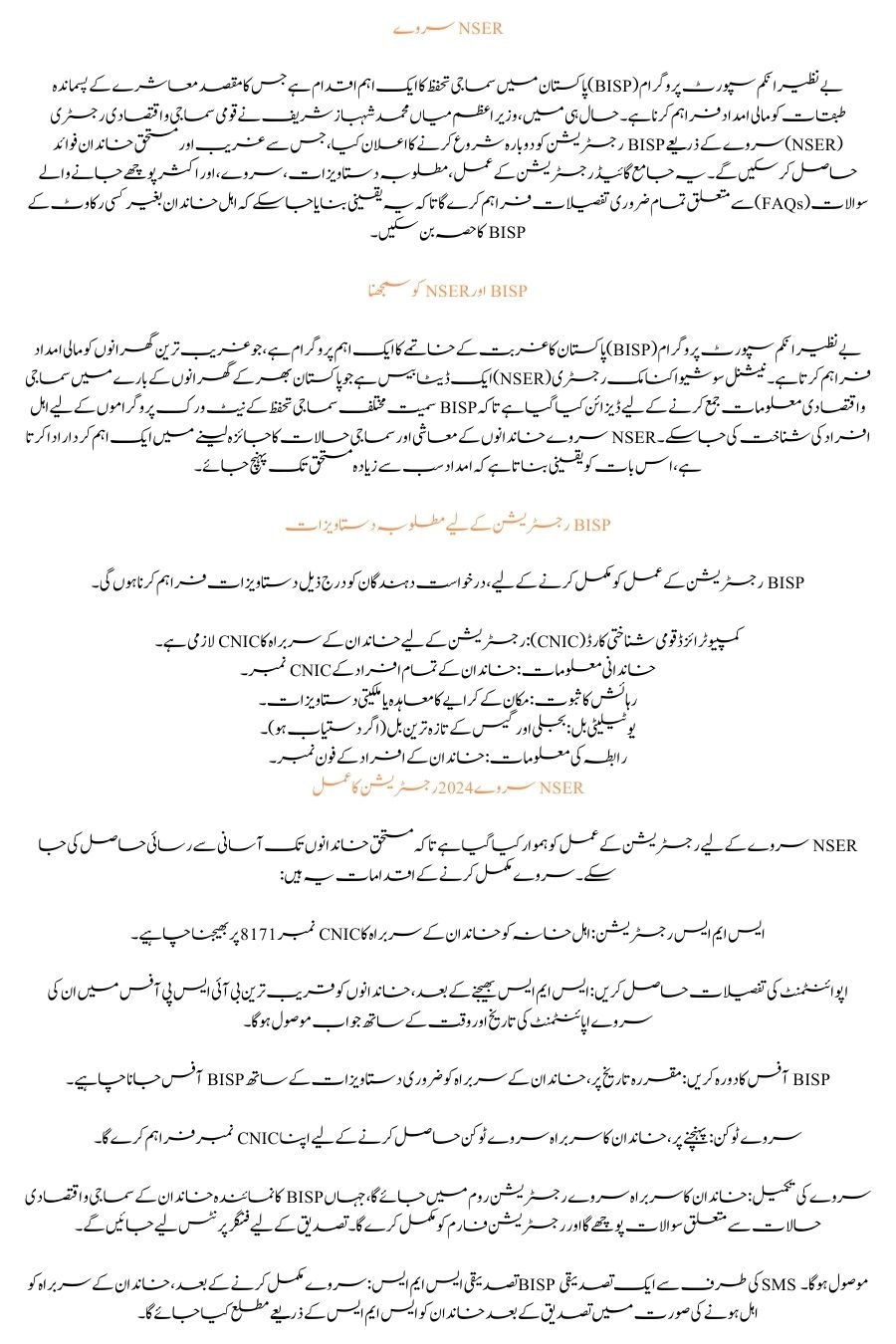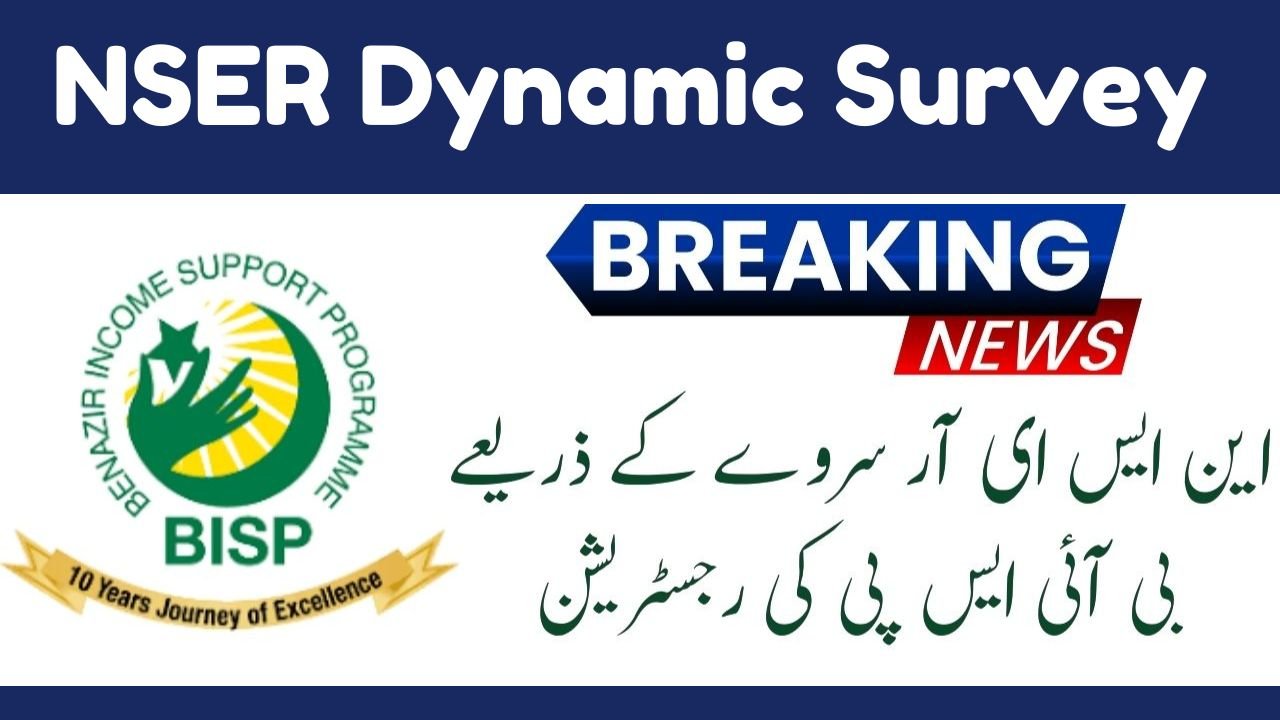NSER Survey
The Benazir Income Support Program (BISP) is a significant social safety net initiative in Pakistan aimed at providing financial assistance to the underprivileged sections of society. Recently, Prime Minister Mian Muhammad Shahbaz Sharif announced the resumption of BISP registration through the National Socio-Economic Registry (NSER) survey, enabling poor and deserving families to receive benefits. This comprehensive guide will provide all necessary details regarding the registration process, required documents, the survey, and frequently asked questions (FAQs) to ensure that eligible families can seamlessly become part of the BISP.
Understanding BISP and NSER
The Benazir Income Support Program (BISP) is Pakistan’s flagship poverty alleviation program, providing financial aid to the poorest households. The National Socio-Economic Registry (NSER) is a database designed to collect socio-economic information about households across Pakistan to identify those eligible for various social safety net programs, including BISP. The NSER survey plays a crucial role in assessing the economic and social conditions of families, ensuring that aid reaches the most deserving.
Required Documents for BISP Registration
To complete the BISP registration process, applicants must provide the following documents:
- Computerized National Identity Card (CNIC): The CNIC of the head of the family is mandatory for the registration.
- Family Information: CNIC numbers of all family members.
- Proof of Accommodation: House rental agreement or proprietary documents.
- Utility Bills: Latest electricity and gas bills (if available).
- Contact Information: Phone numbers of the family members.
NSER Survey 2024 Registration Process
The registration process for the NSER survey has been streamlined to facilitate easy access for deserving families. Here are the steps to complete the survey:
SMS Registration: Families must send the CNIC number of the family head to 8171.
Receive Appointment Details: After sending the SMS, families will receive a reply with the date and time for their survey appointment at the nearest BISP office.
Visit BISP Office: On the scheduled date, the family head must visit the BISP office with the required documents.
Survey Token: Upon arrival, the family head will provide their CNIC number to receive a survey token.
Survey Completion: The family head will proceed to the survey registration room, where a BISP representative will ask questions related to the socio-economic conditions of the family and complete the registration form. Fingerprints will be taken for verification.
Confirmation SMS: After completing the survey, the family head will receive a confirmation SMS from BISP. If eligible, the family will be informed through SMS after verification.

Questions Asked in the NSER Survey 2024
The NSER survey includes various questions to capture a comprehensive socio-economic profile of the family. Some of the key questions are:
- Personal Information:
- Name of the head of the family
- CNIC numbers of all family members
- Number of family members
- Age and gender of each family member
- Educational qualification
- Employment status
- Income and Financial Details:
- Sources of monthly income
- Total monthly income
- Any government or non-government financial assistance
- Housing and Living Conditions:
- Type of housing (rented or owned)
- Number of rooms and living facilities
- Availability of electricity, water, gas, and other basic amenities
- Health and Education:
- Health status of family members
- Any permanent illness or disability
- Access to health facilities
- Education level of children
- Reasons for any child dropping out of school
- Assets and Agricultural Resources:
- Ownership of land or property
- Agricultural production resources
- Livestock or other agricultural assets
Frequently Asked Questions (FAQs)
What is the Benazir Income Support Program (BISP)?
BISP is a social safety net initiative launched by the government of Pakistan to provide financial assistance to the poorest segments of society, aiming to alleviate poverty and improve living standards.
Who is eligible for BISP?
Families identified as poor and deserving based on the NSER survey are eligible for BISP. The survey assesses various socio-economic factors to determine eligibility.
How can I register for BISP?
To register for BISP, send the CNIC number of the family head to 8171, receive the appointment details via SMS, visit the nearest BISP office on the scheduled date, complete the NSER survey, and await confirmation.
What documents are required for BISP registration?
Required documents include the CNIC of the family head, CNIC numbers of all family members, proof of accommodation, latest electricity and gas bills (if available), and phone numbers.
How long does it take to receive the confirmation SMS after completing the survey?
The confirmation SMS is typically sent immediately after completing the survey. If not received, you can send your CNIC number to 8171 to check the status.
What kind of questions are asked in the NSER survey?
The survey includes questions about personal information, income, housing, health, education, and assets to comprehensively assess the socio-economic status of the family.
Is there any fee for completing the NSER survey and registering for BISP?
No, the NSER survey and BISP registration process are free of charge.
Can I complete the NSER survey online?
Currently, the survey process involves visiting the BISP office. However, the initial registration and appointment scheduling can be done via SMS.
What happens if I miss my survey appointment?
If you miss your appointment, you should send your CNIC number to 8171 again to reschedule.
How often is the NSER survey conducted?
The NSER survey is conducted periodically to update the database and ensure accurate assessment of socio-economic conditions.
Final Words
The resumption of BISP registration through the NSER survey is a crucial step towards supporting the poor and deserving families in Pakistan. By following the detailed instructions and understanding the process, eligible families can ensure they receive the necessary financial assistance. This initiative not only provides immediate relief but also aims to improve the overall socio-economic conditions of the beneficiaries, paving the way for a more equitable society.
